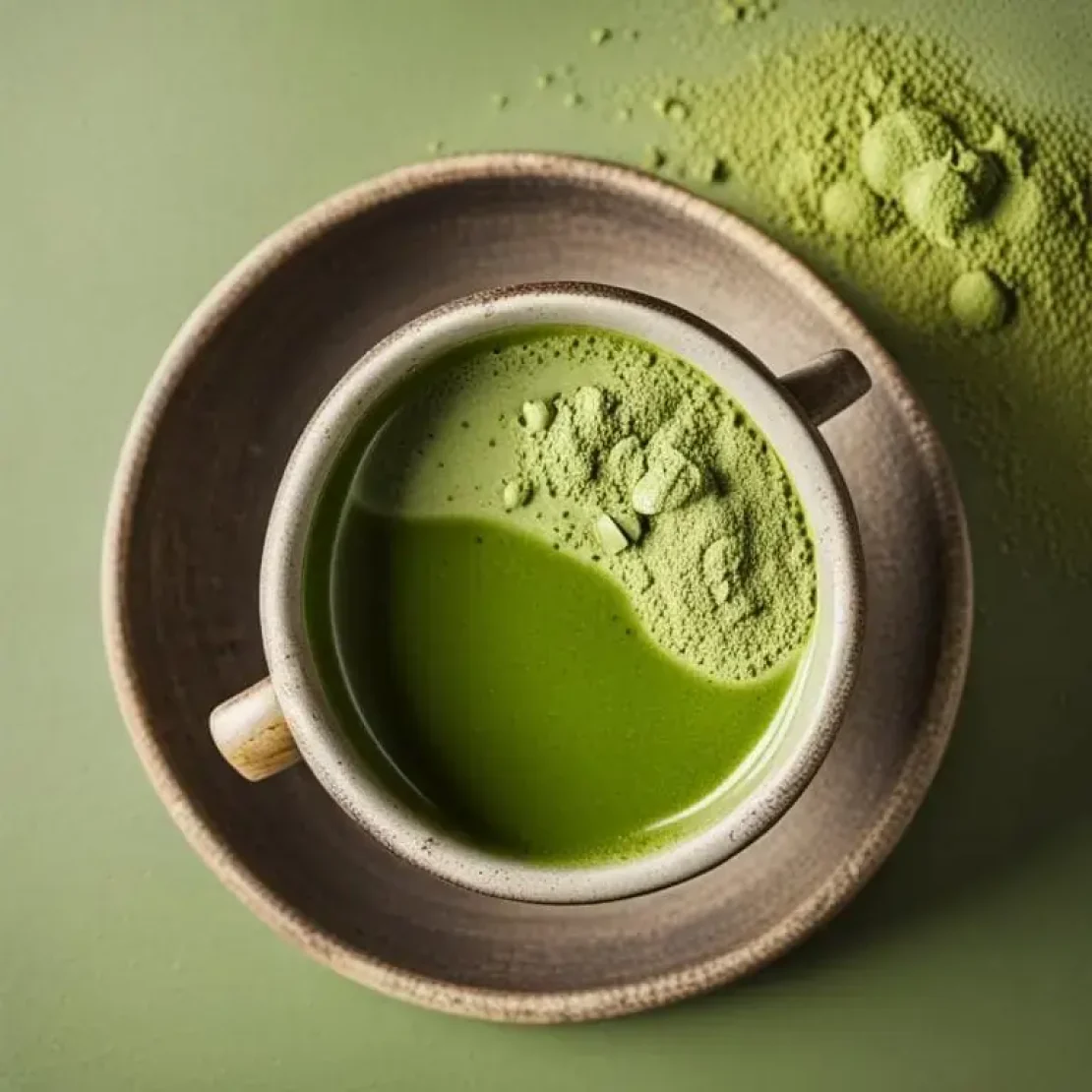Matcha, a vibrant green tea powder originating from Japan, has gained global popularity due to its numerous health benefits. Unlike regular green tea, matcha is made from whole tea leaves that are finely ground into a powder, offering a more potent and concentrated source of nutrients. It’s not just a trendy drink; matcha is known to boost metabolism, enhance focus, and provide a wealth of antioxidants. In this article, we will explore the many benefits of matcha, its role in improving metabolism and cognitive function, and the best ways to incorporate it into your daily routine.
What is Matcha? A Brief Overview
Matcha is a type of green tea made from the leaves of the Camellia sinensis plant. The process of producing matcha involves shading the tea plants several weeks before harvest, which boosts the chlorophyll content and gives the leaves their vibrant green color. After harvesting, the leaves are steamed, dried, and stone-ground into a fine powder. This unique method of production preserves the maximum amount of nutrients, making matcha a powerhouse of health benefits.
Health Benefits of Matcha Green Tea Powder
High in Antioxidants
One of the most significant health benefits of matcha is its high antioxidant content. Matcha contains catechins, a type of antioxidant known to help reduce the risk of chronic diseases. In particular, it is rich in epigallocatechin gallate (EGCG), which is believed to have strong anti-cancer properties. Consuming matcha regularly can help combat oxidative stress, reduce inflammation, and promote overall health.
Boosts Metabolism and Energy Levels
Matcha is an excellent natural stimulant that can help boost metabolism and energy levels. The combination of caffeine and L-theanine, a rare amino acid found in matcha, provides a sustained energy boost without the jitters often associated with coffee. Studies have shown that matcha can increase the body’s thermogenic rate, thereby enhancing fat burning and aiding in weight loss.
Enhances Cognitive Function and Focus
Matcha is often celebrated for its ability to enhance focus and concentration. The L-theanine present in matcha promotes alpha brain waves, which are associated with a calm but alert mental state. This makes matcha a perfect drink for those who need to maintain focus and clarity throughout the day. Unlike other caffeinated beverages, matcha provides a balanced energy boost without a subsequent crash, making it ideal for work or study sessions.
Supports Heart Health
Regular consumption of matcha has been linked to improved heart health. The antioxidants in matcha, particularly catechins, help reduce LDL cholesterol levels and prevent the oxidation of cholesterol in the arteries. This, in turn, lowers the risk of heart disease and stroke, making matcha a heart-friendly beverage.

How Matcha Boosts Metabolism and Energy Levels
Matcha is known for its ability to boost metabolism and energy levels due to its unique nutritional profile. Unlike regular green tea, which is steeped and then discarded, matcha powder is consumed whole, providing a more concentrated dose of nutrients. The caffeine content in matcha, combined with L-theanine, helps improve both physical and mental performance.
- Thermogenic Properties: Matcha has thermogenic properties, meaning it helps increase the body’s ability to burn calories. Research suggests that matcha can increase calorie burning by up to 10% to 40%, depending on the individual’s metabolism.
- Fat Oxidation: Drinking matcha before exercise can enhance fat oxidation, allowing the body to burn fat more efficiently during workouts. This makes matcha an excellent addition to a weight loss or fitness regimen.
Best Ways to Use Matcha for Improved Focus
Matcha Tea
The most traditional way to consume matcha is by preparing matcha tea. To make matcha tea, simply whisk one teaspoon of matcha powder with hot (not boiling) water until frothy. Drinking matcha tea regularly can help enhance focus and concentration, making it an excellent morning or midday beverage.
Matcha Latte
For a more indulgent experience, try a matcha latte. Combine matcha powder with hot milk or a dairy-free alternative like almond or oat milk. This creamy beverage is perfect for those who prefer a milder, sweeter taste while still reaping the benefits of matcha.
Matcha Smoothies
Adding matcha powder to your morning smoothie is a great way to start the day with an energy boost. Combine matcha with fruits like bananas, spinach, and almond milk for a nutrient-packed drink that can help improve focus and metabolism.
Matcha Recipes for Weight Loss and Mental Clarity
- Matcha Overnight Oats: Combine rolled oats, almond milk, a teaspoon of matcha powder, and chia seeds in a jar. Refrigerate overnight for a quick and healthy breakfast option that boosts metabolism and energy levels.
- Matcha Chia Pudding: Mix matcha powder with chia seeds, almond milk, and a natural sweetener like honey or maple syrup. Let it sit for a few hours or overnight for a delicious, nutrient-rich pudding that promotes mental clarity.
- Matcha Energy Balls: Blend matcha powder with nuts, dates, and a bit of coconut oil to create energy balls. These are perfect for a quick snack that enhances focus and boosts metabolism.
Comparing Matcha with Regular Green Tea for Health
While both matcha and regular green tea come from the same plant, matcha provides a more concentrated source of nutrients due to its unique processing method. Here are a few key differences:
- Nutrient Density: Matcha is richer in antioxidants, particularly EGCG, compared to regular green tea. This makes it more effective in combating free radicals and promoting overall health.
- Caffeine Content: Matcha contains more caffeine than regular green tea, providing a more sustained energy boost. However, the presence of L-theanine in matcha ensures that this energy boost is balanced and does not lead to anxiety or a crash.
- Flavor Profile: Matcha has a richer, more robust flavor compared to regular green tea. This makes it a versatile ingredient that can be used in various recipes.
How to Prepare Matcha for Maximum Benefits
To get the most out of your matcha, it is essential to prepare it correctly:
- Use Fresh Matcha Powder: Always use fresh, high-quality matcha powder. Store it in an airtight container away from light and heat to preserve its potency.
- Use the Right Water Temperature: Boiling water can scorch matcha powder, leading to a bitter taste. Use hot water at around 175°F (80°C) to maintain its delicate flavor and nutrients.
- Whisk Vigorously: Use a bamboo whisk (chasen) to whisk matcha powder with water in a zigzag motion until frothy. This ensures a smooth, lump-free texture.
Matcha and Its Role in Enhancing Cognitive Function
The combination of caffeine and L-theanine in matcha makes it an effective tool for enhancing cognitive function. Research suggests that L-theanine increases the production of alpha waves in the brain, promoting relaxation without drowsiness. This, coupled with caffeine, can improve memory, attention, and overall mental performance.
Incorporating Matcha into Your Daily Routine for Focus
Here are some simple ways to incorporate matcha into your daily routine:
- Morning Ritual: Start your day with a cup of matcha tea to boost metabolism and enhance focus.
- Pre-Workout Drink: Consume matcha before a workout to enhance fat burning and endurance.
- Afternoon Pick-Me-Up: Replace your afternoon coffee with a matcha latte to avoid the caffeine crash and maintain steady energy levels.
Conclusion
Matcha is more than just a trendy green tea; it is a powerful health beverage with numerous benefits. From boosting metabolism and energy levels to enhancing cognitive function and focus, matcha offers a natural way to improve overall well-being. Whether you enjoy it as a tea, in a latte, or added to your favorite recipes, incorporating matcha into your daily routine can help you feel more energetic, focused, and healthy.
References:
- Harvard Health Publishing – Benefits of Green Tea
- National Center for Biotechnology Information (NCBI) – Effects of Matcha on Metabolism and Cognitive Function
- Journal of Clinical Biochemistry and Nutrition – Antioxidant Properties of Matcha Green Tea









